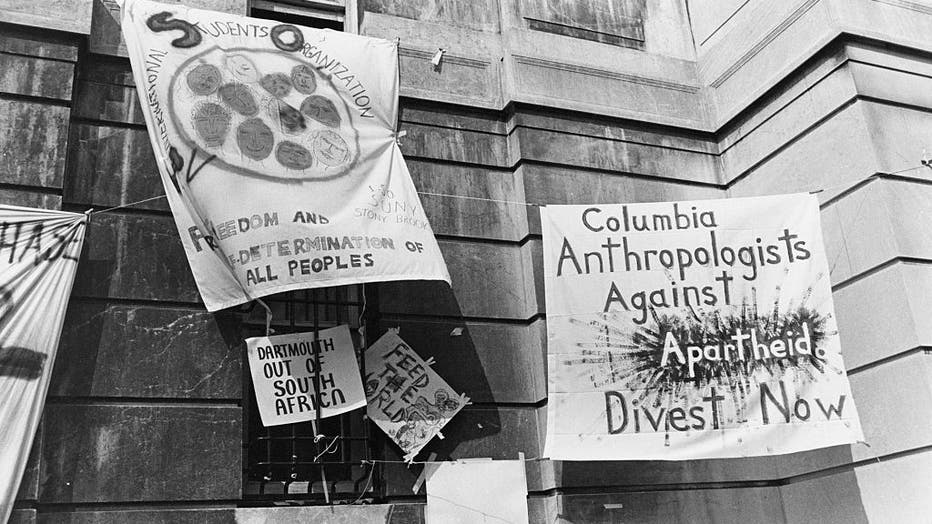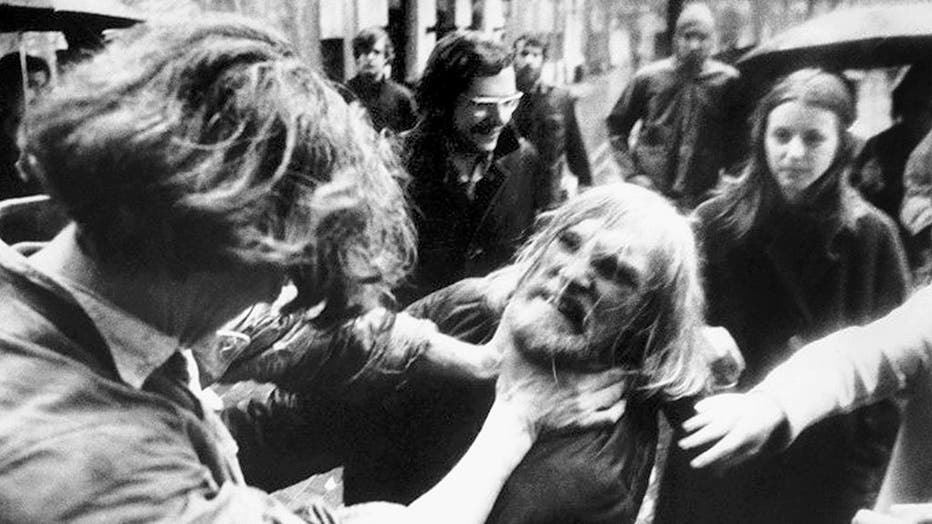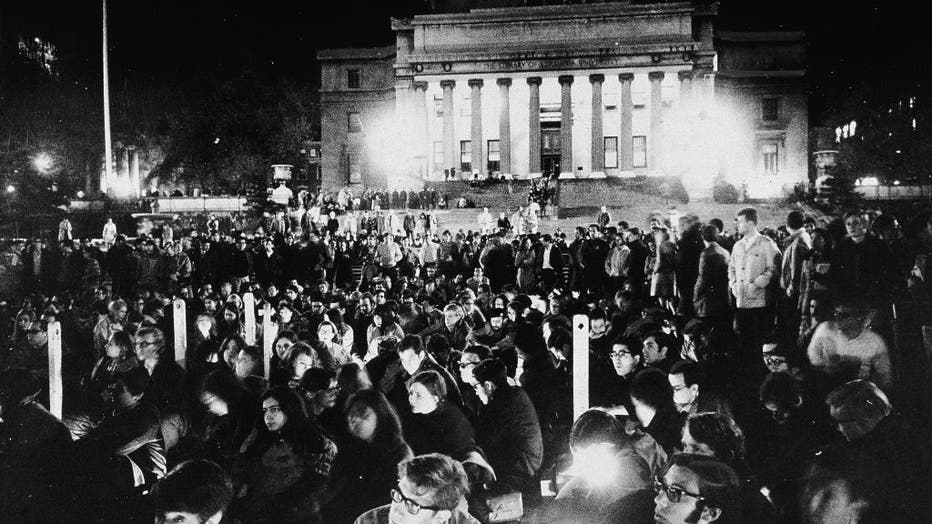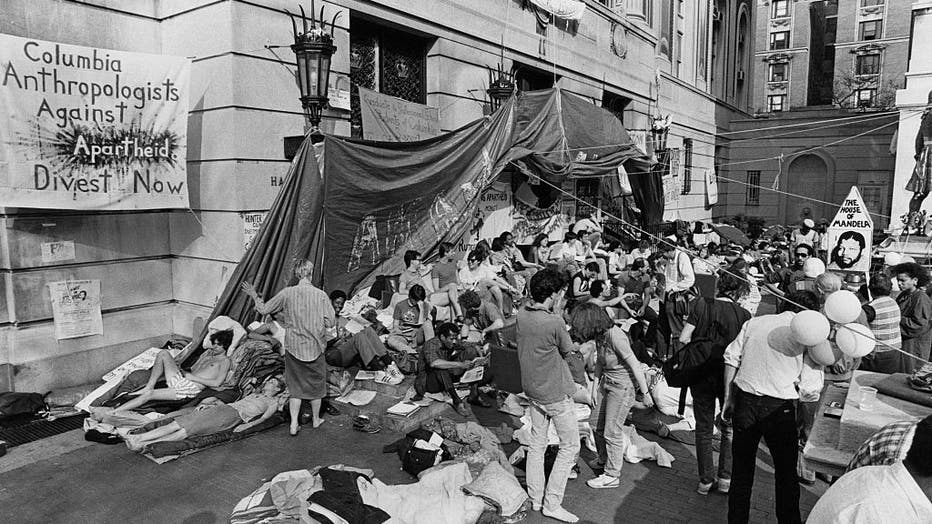WATCH: Historical coverage of Columbia University student protests

The history of student protests at Columbia
Columbia University has a long history of student-led protests on its campus. From Vietnam to opposing apartheid, FOX 5 NY's Sharon Crowley takes a look back at some of the demonstrations and how they compare to today.
NEW YORK - It's no coincidence that Columbia University pro-Palestinian protesters chose to take over Hamilton Hall days after establishing an encampment against the Israel-Hamas war.
Over the last century, Columbia students have been known to make demands for change. Watch historical FOX 5 NY coverage of 1978 anti-apartheid protests in the media player below.

Fox reports on 1978 protests at Columbia
Columbia University has a long history of student protests going back decades.
Often, these protests lead to police intervention and arrests, and they almost always end in conversations between students and administrators.
In essence, the pro-Palestinian protests that have taken over the university in the past week are nothing new. One professor told the Associated Press that when you go to Columbia, "you know you're going to an institution which has an honored place in the history of American protest."
Doctor Libby O'Connell, a former chief historian for the History channel, says demonstrations at Columbia always stole the limelight mostly because they were the headquarters of a group called the students for democratic society, the S.D.S, which became increasingly radicalized by 1968.
O'Connell also notes that Martin Luther King had been assassinated that same spring, a few weeks before the demonstrations began.
Here's a look back at a tradition that dates back more than five decades.

Banners at anti-apartheid protest by students at the entrance to the Hamilton Hall building of Columbia University, New York City, 4th April 1984. The protesters are calling for the university to divest itself of its investments in South Africa. (Pho
Columbia Vietnam protest, 1968

A Columbia University student responds violently to one of the students whose campus strike, to protest the Vietnam War and local disputes between the university and the surrounding community, has blocked his way to class. (Photo by Mel Finkelstein/N
One of the students who joined the 2024 encampment said that "a lot of students here are aware of what happened in 1968."
In April 1968, students were protesting the university's connection to an institute that was allegedly doing weapons research for the Vietnam War.

A large crowd of students and others gather in front of the Low Librray on the Columbia University campus during a rally about the Viet Nam War, New York, New York, April 29, 1968. (Photo by Barton Silverman/New York Times Co./Getty Images)
Some of them were also protesting how the elite school treated Black and brown residents in the community around the school as well as the atmosphere for minority students.
The students took over five campus buildings, including Hamilton Hall, which they renamed "Malcolm X Liberation College," The NYPD was brought to campus to clear them out.
The arrests, 700 of them, were not gentle. Fists were flying, clubs swinging. Dozens of students and more than a dozen officers were injured.
Professor Jack Halberstam who teaches gender studies and English at Columbia University, said "the University is quite proud of, you know, this history of protest on the campus. And, it's considered quite a legacy that there were these successful protests by students."
Columbia Apartheid protests, 1978
In 1978, FOX 5 NY reported students wearing white armbands during commencement in protest of the school doing business in South Africa.
The students managed to get then-University President William McGill in one-on-one talks over the school's investments.

An anti-apartheid protest by students at the entrance to the Hamilton Hall building of Columbia University, New York City, 4th April 1984. The protestors are calling for the university to divest itself of its investments in South Africa. (Photo by Ba
"At Columbia University, there is anger because the school owns stocks and companies doing business in South Africa," Channel 5's Anthony Preisendorf reported from campus.
At the time, protesters reportedly gathered outside the main gate, supervised closely by New York City police, and the university's security forces.
At the heart of the protest was the fact that Columbia allegedly had investments in 44 companies that held assets in South Africa. These university holdings were valued at $80 million, representing a third of Columbia's investment portfolio.

Rev. Jesse Jackson speaks while standing under an umbrella during rally at Columbia University.
A small but determined group of students argued that the university's continued investments constituted support for a legalized system of racism.
Fast forward to 1985, and students also held a takeover against apartheid in South Africa, renaming Hamilton "Mandela Hall."
Professor Halberstam says that, looking back now, it appears the students were on the right side of history.
He said "clearly these passions are in many respects very much, about social justice and a population wronged in their view that people felt about Vietnam in the 1960s."
The Associated Press contributed to this report.

